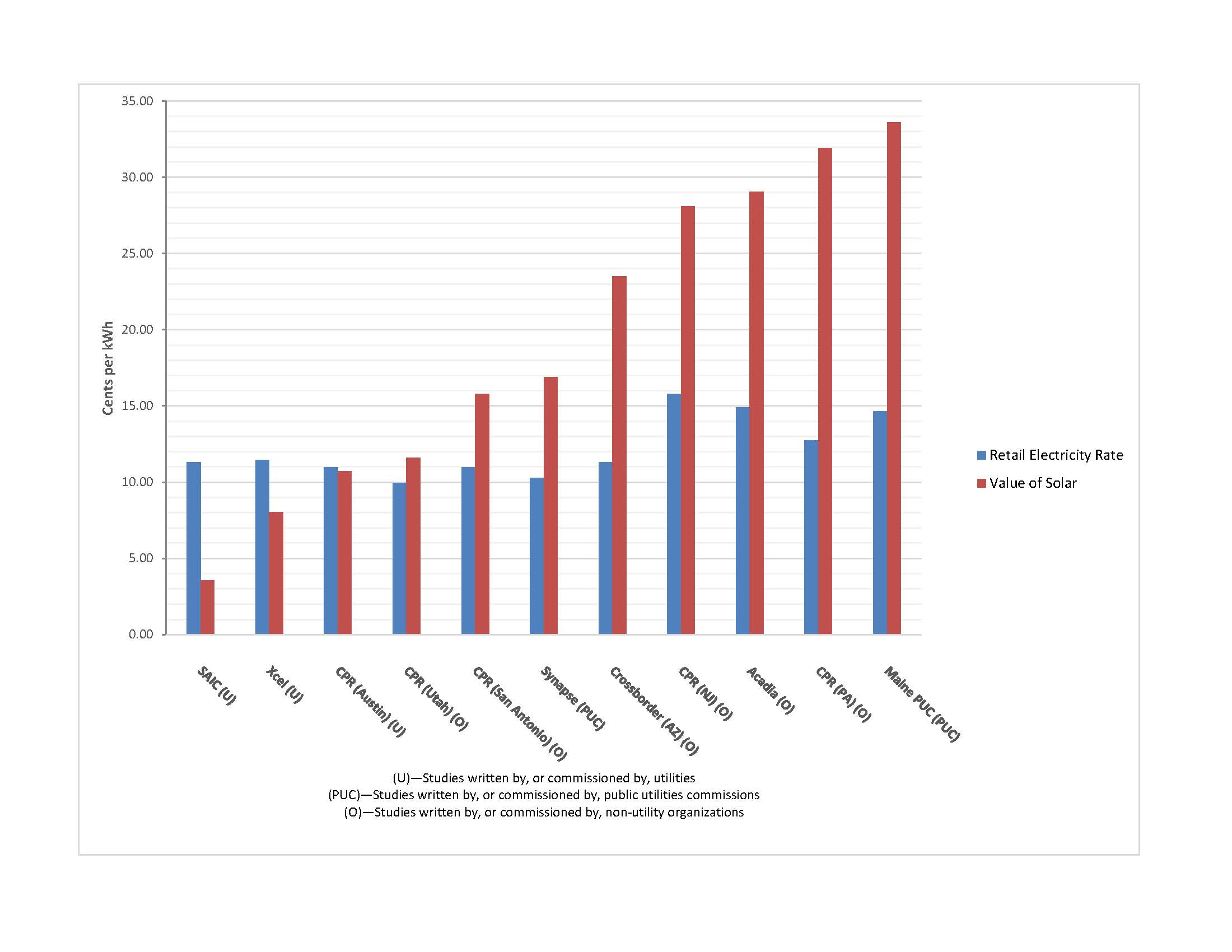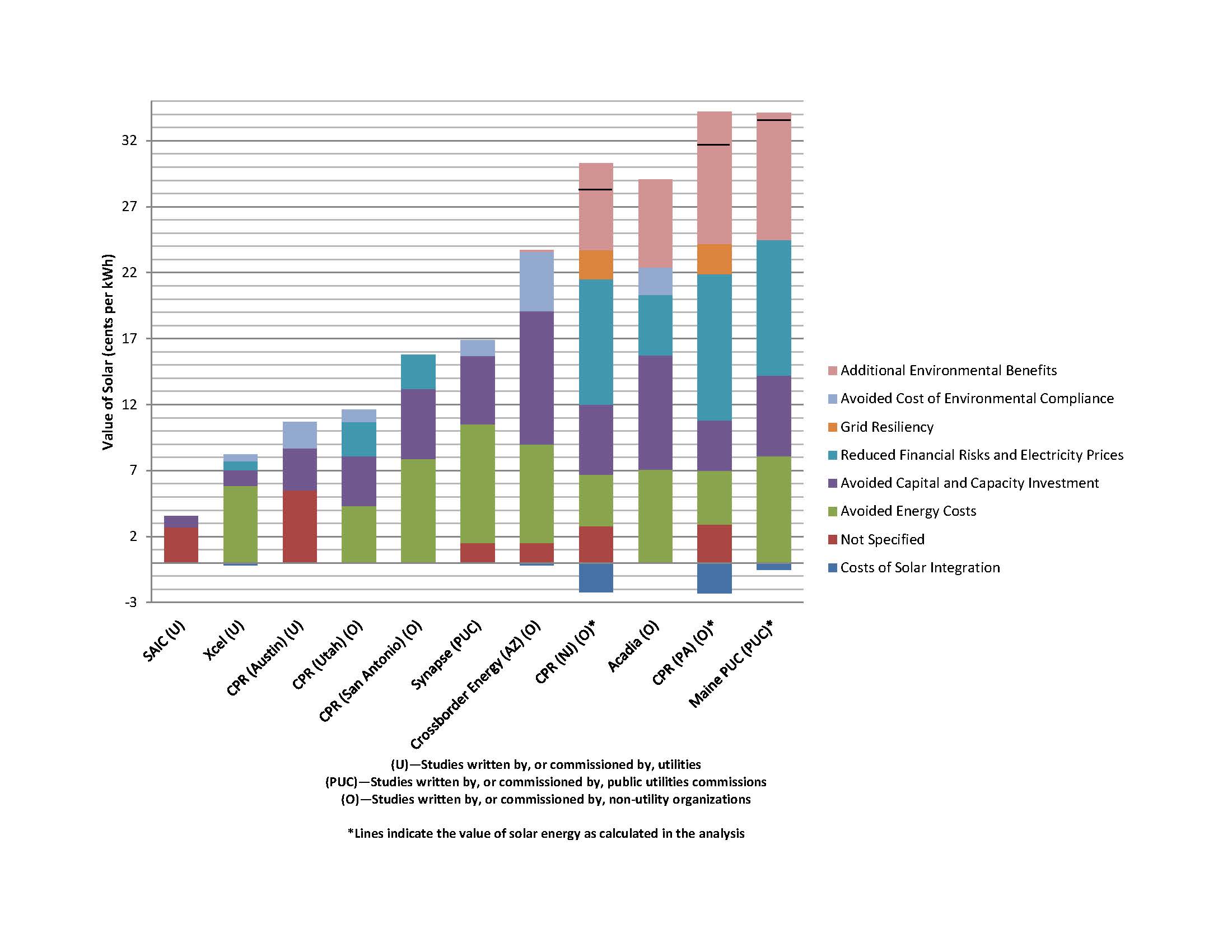Note: A more recent version of this report is available.
Solar energy creates many benefits for the electricity grid.
- Avoided energy costs: Solar energy systems produce clean, renewable electricity on-site, reducing the amount of electricity utilities must generate or purchase from fossil fuel-fired power plants. In addition, solar photovoltaic (PV) systems reduce the amount of energy lost in generation, long-distance transmission and distribution. These losses cost the country millions of dollars every year.
- Avoided capital and capacity investment: By reducing overall demand for electricity, solar energy production helps ratepayers and utilities avoid the cost of investing in new power plants, transmission lines and other forms of electricity infrastructure.
- Reduced financial risks and electricity prices: Because the price of solar energy tends to be stable over time, while the price of fossil fuels can fluctuate sharply, integrating more solar energy into the grid reduces consumers’ exposure to volatile fossil fuel prices. Also, by reducing demand for energy from the grid, solar PV systems reduce its price, saving money for all ratepayers.
- Increased grid resiliency: Increasing distributed solar PV decentralizes the grid, potentially safeguarding people in one region from other areas that are experiencing problems.
- Avoided environmental compliance costs: Increasing solar energy capacity helps utilities avoid the costs of installing new technologies to clean up fossil fuel-fired power plants or meeting renewable energy requirements.
Solar energy also creates valuable benefits for the environment and society at large.
- Avoided greenhouse gas emissions: In 2013, the electricity sector was the largest source of global warming emissions—responsible for 31 percent of all total U.S. greenhouse gas pollution. Generating energy from the sun provides a renewable source of energy that produces no greenhouse gas emissions. Since 2007, solar energy has averted approximately 71 million metric tons of carbon dioxide emissions.
- Reduces air pollution that harms public health: According to the American Lung Association, 44 percent of Americans live in a place where pollution often reaches dangerous levels. Expanding the nation’s ability to obtain clean electricity from the sun reduces our dependence on fossil fuels, and lessens the amount of harmful emissions that flow into the air we breathe.
- Creates jobs and spurs local economies: The solar energy industry is growing rapidly, creating new jobs and businesses across the nation. In 2014, the solar energy industry added jobs at a rate 20 times that of the overall economy, and economists predict that it will grow at a rate of 20.9 percent in 2015.
The benefits solar homeowners provide to the grid, and to society generally, are often worth more than the benefits they receive through net metering.
- All 11 analyses reviewed here found that solar energy brought net benefits to the grid.
- Eight analyses out of 11 found that the value of solar energy was worth more than the average residential retail electricity rate in the area at the time the analysis was conducted. The three analyses that found different results were all commissioned by utilities. (See Figure ES-1.)
- Of these 11 analyses, the median value of rooftop solar energy was 16.90 cents per kWh, compared with an average U.S. residential retail electricity rate of 11.88 cents per kWh in 2012.
- The studies that estimated lower values for solar energy consistently undervalued, or did not include, important environmental and societal benefits that come from generating electricity from the sun.
Figure ES-1: Retail Electricity Rates and the Values of Solar Energy in 11 Cost-Benefit Analyses.
Figure ES-2: A Comparison of Cost-Benefit Analyses of Solar Energy by Study and Category.
Net metering policies have been critical to the growth of solar energy in the United States. To continue America’s momentum toward a clean energy future, policymakers should continue and expand net metering policies. Specifically:
- States should lift arbitrary caps that limit availability of net metering in fast-growing solar markets.
- State or local governments that evaluate the benefits and costs of net metering should ensure that a full range of benefits is considered by using a methodology that includes environmental and societal benefits.
- State and local governments should consider the simplicity of net metering when evaluating programs that compensate customers for the solar electricity they provide to the grid.
- State and local governments should reject alternatives to net metering that do not provide residential and business customers full and fair compensation for the value they provide to the grid and society.
- State and local governments should ensure that all people can take advantage of net metering policies, including multifamily homes or homes without out sunny roofs, by implementing virtual net metering programs.
Topics
Authors


